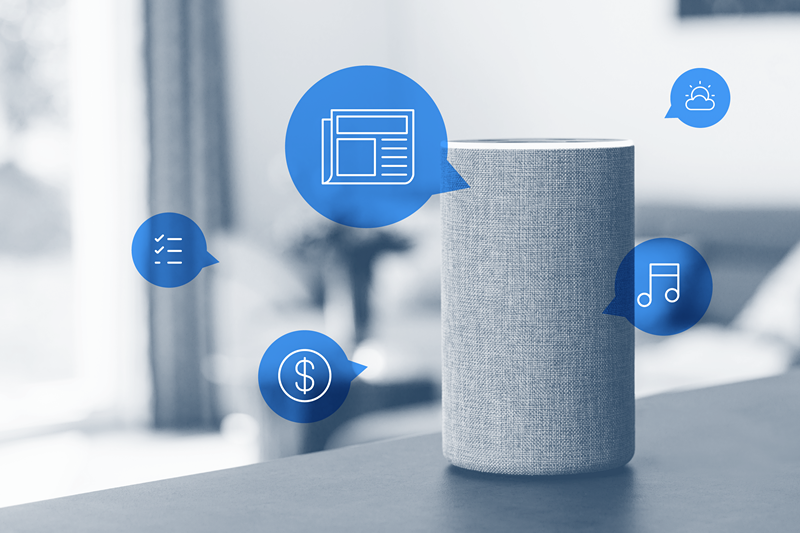And then there's the question of what they do with those recordings.
还有一个问题就是他们怎么处理这些录音。
Does anyone else hear my question?
有人听到我的问题吗?
I think most people don't really know that they do send that recording to a server, that humans might listen to your recording, which sounds kind of creepy,
我想大多数人都不知道他们会把录音发送到服务器,有人可能会听你的录音,这听起来有点恐怖,
but it's really for accuracy purposes, to make sure that they're responding to the right things.
但这确实是为了准确起见,以确保他们做出正确的回应。
But obviously, if you don't know that that's a possibility, you might not really like that.
但很明显,如果你不知道可能会发生这种事的话,你可能不会真的喜欢。
In fact, 31% didn't like that.
事实上,31%的人不喜欢这样。
We give them a lot of this data, we expose a ton of our information to them, and I don't know, ultimately, what they're using it for, and neither do you.
我们给他们提供了大量的数据,我们向他们公开了大量的信息,最终我不知道他们用这些信息干什么,你也不知道。
One thing we can assume they're using our voice data for is some form of ad targeting.
我们可以假设他们利用我们的语音数据进行某种形式的广告定位。
Google says it doesn't use the recordings themselves, but may use a text read-out of your recording to show you personalized ads.
谷歌表示,他们不会使用这些录音本身,但可能会使用从你的录音中读出的文本向你展示个性化广告。
Amazon has been more vague.
亚马逊一直比较含糊。
It says it doesn't use your data to target ads, but that it may use it on Amazon.com, which of course is powered not by ads, but by sophisticated product recommendations.
他们说不会用你的数据来定位广告,但它可能会在亚马逊网站上用到它,这不是靠广告,而是靠复杂的产品推荐。
What's clear, though, is that they feel very confident about how valuable our voice data could be.
不过显而易见的是,他们对我们语音数据的价值非常有信心。
That's why they're adding smart-speaker technology to so many different products, so that they can collect more.
这就是为什么他们在这么多不同的产品中加入了智能语音技术,这样他们就可以收集更多。
It's also partly why smart-speakers are so cheap; as little as 10 bucks in the US, because the real price is our data.
这也是智能语音助手如此便宜的部分原因;它在美国只卖10美元,因为我们的数据才是真正有价值的东西。

There's a longer-term thing that some privacy experts have sort of brought up to me,
一些隐私专家向我提出了一个长期存在的问题,
which is, the more common they are, the more comfortable we get with them in every aspect of our lives, the more comfortable we maybe get with there being things that take data, and information exposure all around our lives.
也就是说,它们存在得越普遍,我们在生活的方方面面与它们相处得就越融洽,我们可能就越融洽地对待那些在我们生活中获取数据和信息的事情。
In 2019, Amazon announced its new "Sidewalk" feature.
2019年,亚马逊宣布推出新的“Sidewalk”功能。
When implemented, it will connect your smart speaker with others in your vicinity, like the ones in your neighbor's homes.
安装后,它会将你和你附近人的智能语音助手连接起来,比如你邻居的。
But you wouldn't know that unless you checked your settings.
但你不会知道这一点,除非你检查你的设置。
It's an opt out, not an opt in.
这是“选择退出”,而不是“选择加入”。
When something's opt-out, it means that they want as many people as possible to be doing it.
当某件事是“选择退出”时,这就意味着他们希望尽可能多的人去做这件事。
Thanks to public pressure, tech companies have made it easier to opt-out of some data-sharing features.
由于公众的压力,科技公司更容易对一些数据共享功能设置成“选择退出”。
On Amazon products, you can set your recordings to automatically delete and prevent Amazon from using your recordings to train its system.
在亚马逊产品上,你可以将你的录音设置为自动删除,并阻止亚马逊使用你的录音来训练其系统。
Google has an option to turn off ad personalizations.
谷歌可以选择关闭广告个性化。
The reason that they have done that is because they've kinda gotten in trouble.
他们这么做是因为他们陷入了麻烦。
Or people have found them doing things that they didn't know about and got upset.
或者用户发现他们做了一些自己不知道的事情而感到不安。
Always makes you wonder, what is the thing we're going to catch them doing later that they're doing right now?
他们总是会让你感到好奇:我们通过他们现在做的事情,会发现将来他们要做什么呢?
The huge popularity of smart-speakers shows that we've already entered a new wave of technology, made by companies whose goal is to learn everything they can about us.
智能语音助手的广泛普及表明,我们已经被卷入了一个新的科技浪潮,而这是由那些目标是尽可能了解我们的公司制造的。
And what they might do with that information is still a mystery.
他们会如何处理这些信息仍然是个谜。











